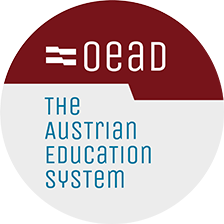KINDERGARTEN
- Age-appropriate care for children up to school-age.
- Various forms of elementary education: crèches, kindergartens, nurseries, children's groups, playgroups and (male and female) childminders.
- Availability of special needs education, remedial education and integrated education.
- Compulsory final year of kindergarten.
General
The main differences between the various forms of institutional childcare in Austria relate to the age-structure of the children being cared for in a crèche, kindergarten, nursery or children's group and the designations assigned to these types of institution differ considerably between one federal province and another. Childcare services are also provided by playgroups and (male and female) childminders.
Over 60 percent of all childcare institutions are operated by territorial bodies (mainly municipalities). Other childcare institutions are operated by parishes, family organisations, charitable associations, companies and private individuals.
Children with special needs can attend a general kindergarten, a kindergarten with integrative groups or a remedial educational kindergarten for children with special needs.
Since September 2010, all children whose fifth birthday falls on 31 August or earlier are required to attend an institutional childcare facility. Attending a kindergarten in the morning or afternoon will account for 20 hours a week and is compulsory between the months of September and June, except during school holidays. In addition to the school holiday periods and any individual days on which schools are not open, a holiday may be taken for a period of up to 5 weeks.
Crèches
Crèches provide age-appropriate childcare for children below the age of three. As the services provided by crèches are primarily targeted at working parents and single parents, the majority of crèches are open all day on a continuous basis and are open all year round. They can predominantly be found in larger towns and cities. Two thirds of the crèches in Austria are located in Vienna.
Kindergartens
Kindergartens provide supplementary non-family childcare to children from the age of three years up to school-age. The objective of the education provided in a kindergarten is to promote the physical, intellectual and emotional development of the children through suitable forms of play and the educational effect of the group. The kindergarten is generally accepted as the form of pre-school education on offer.
Children's groups
Children's groups (Kindergruppen) have become established alongside the conventional child-care facilities. These are characterised by a high degree of parental input and parental self-responsibility. In the majority of cases, the children are cared for in mixed-age groups consisting of five to ten children. In some federal provinces, the term 'children's group' is also used for nurseries and other mixed-age childcare facilities.
Childminders (male and female)
Childminders primarily care for small children, mostly together with other children in a private household. In recent years, the importance of this type of childcare has increased significantly, due to the fact that on the one hand, the number of children in daily childcare has increased, whilst on the other hand the level of qualifications held by childminders has improved. In some federal provinces, childminders are required to undergo compulsory training.
Opportunities for special needs education and inclusive education
In principle, it is possible to place a child with a disability in a general kindergarten, a kindergarten with integration groups or a special education kindergarten. Inclusive education means a great opportunity for all children, especially at preschool age, because children have even fewer prejudices and social learning plays an important role in all kindergartens.
The next step:
After completing their pre-school education, children will start to attend primary school, where they will remain for four years. Children who are not yet ready to attend primary school will be able to attend a pre-school year. Children with special educational needs will be provided with primary school teaching incorporating specialist help in the context of integrated classes. Alternatively, they may be given the option of attending a special school that is in keeping with the disability involved.
Sources (in German)
Kindergarten
https://www.oesterreich.gv.at/themen/familie_und_partnerschaft/kinderbetreuung/2/Seite.370130.html
Inclusion of children with disabilities - kindergarten
https://www.oesterreich.gv.at/themen/menschen_mit_behinderungen/kindheit_und_behinderung/Seite.1220600.html
Elementary education
https://www.bmbwf.gv.at/Themen/ep.html


































